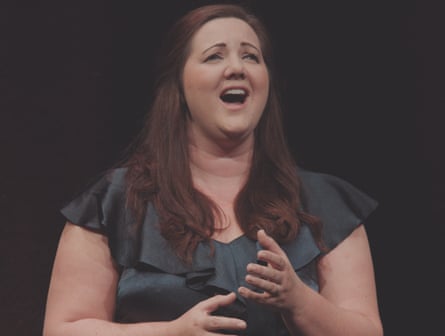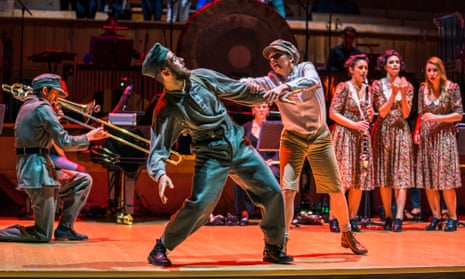Guru, inventor, tyrant, magus; wearer of orange jumpers and white trousers; father of electronic music: the German composer Karlheinz Stockhausen (1928-2007) was all these things. Read up on him and be nonplussed. The most influential avant garde composer of the 20th century, he exhausted, repelled and inspired. No idea was too epic. A piece for three orchestras and three conductors, dictated by the shape of a Swiss mountain? No problem. That was Gruppen, the 1950s megalith that made his early career. His opera cycle, Licht, 29 hours of music in seven instalments marking the days of the week, occupied him for the last decades of his life (and included the fabled Helicopter quartet).
Fourth in the cycle but the first written, Donnerstag aus Licht (1977-1980) – “Thursday from Light” – consists of three acts, a greeting and a farewell. It requires at least three solo voices, eight solo instrumentalists, dancers, choir, orchestra and tape, and is five hours long. Since Stockhausen gave lectures lasting six, it would be flaky to complain, not least to those who take on the nightmarish task of performing it. Donnerstag was given its UK premiere at the Royal Opera House in 1985 but only now, via a production from the Opéra Comique, Paris, already seen there and in Bordeaux, is it back.
There is an air of “I was there” pilgrimage about the whole event, attracting old disciples returning for more, and new. All praise to the Southbank Centre for joining this French collaboration, spearheaded by the experimental, super-versatile ensemble Le Balcon. Shaming to admit, but I had never seen a trombonist simultaneously tap-dance. Nor a tuba player spreadeagled on the floor still playing, tuba on top of him. He (Stuart Beard) was from the London Sinfonietta, who, with the New London Chamber Choir and the Royal Academy of Music Manson Ensemble, joined Le Balcon in performing this taxing and precise score. Maxime Pascal was the formidable conductor.
To say Licht is a cosmic saga is of no help. Donnerstag does, roughly, have a story relating to Stockhausen’s own dark childhood, with composer as hero. Everything is thrown at the multilayered telling, from titbits of science and Caesar’s Gallic wars to arithmetic, mystic mantras, astrology, literary allusion, film, concrete poetry, the clicks, drips and whirs of recorded sound and, in its reference to chaos and angels, sub-William Blake psychobabble. The three characters are Michael and his parents, who with heavy symbolism are named Eve and Lucifer. Part one is about the hero’s early life, part two a journey round the Earth, part three a visionary homecoming.
All was expertly depicted in Benjamin Lazar’s semi-staging, instrumentalists or performers utilising every area of the Festival Hall stage. The action, a few props aside, relied on the skill of terrific singers, players and dancers. As the content became ever less bearable and riddled with Sirian mumbo-jumbo, so the music grew more thrilling and beautifully shaped, not least the central part for solo trumpet – a phenomenal feat of memory by Henri Deléger. In its detail, logic and ingenuity, even across this timespan, the music astonishes. As Stockhausen’s shaman image recedes, so his qualities as a composer shine brighter. After the marathon inside, five trumpeters (from the RAM) played the Farewell outside on the terrace. Their plaintive call-and-refrain mingled with late-night sounds of waiters dragging tables inside, riverboats and last trains home.

Heaven and hell were also on the menu at Glyndebourne. The 2019 festival riskily opened with an opera that is not strictly an opera. Berlioz originally intended La Damnation de Faust, based on the first part of Goethe’s tragedy, for performance in the concert hall. Most of the difficulties in this new production, conducted by music director Robin Ticciati in the 150th anniversary year of the composer’s death, derive from the work’s oratorio-like nature. In the pit, the music rips, seethes and scorches. On stage, the action sags.
In a production for ENO in 2011, Terry Gilliam doused Berlioz’s nervy blend of French Romanticism in the acid of Nazi German imagery. The results, if excessive, were memorable. Richard Jones, for Glyndebourne, has chosen the opposite approach: paring down, emphasising the bookish world of the philosopher Faust (Allan Clayton). Méphistophélès (Christopher Purves) is an archetypal agent of the devil with red, greasy hair, long black coat and violin. Marguerite (Julie Boulianne) enchants as a sweet, exploited barmaid desperate for the wider horizons of love.
In Hyemi Shin’s grey-box set, each scene is identified by a portable doorframe (a device that soon becomes a tic). The cast excels, led by Clayton, poetic and ever sympathetic, glowing so brightly in Nature Immense, Impénétrable et Fière you expected the spindly pine trees to shoot fresh growth. Purves oozed calculating grace, ever the cold logician. Boulianne was a golden-toned Marguerite. The chorus, in hearty voice but too often lagging behind Ticciati’s agile beat, wear horned masks and sit above the stage in tiers, like onlookers in a lecture hall or courtroom. Demon dancers, “that endless line of skeletons dancing” as Faust describes them, skitter in and out in lurid green-yellow body stockings, like arthropods. The shock, not quite welcome, comes at the end. The popular Dance of the Will-o’-the-Wisps is excised from its usual place to provide a baffling finale. Nevertheless, the audience cheered warmly on first night. Ticciati and the London Philharmonic found rich variety in Berlioz’s score. Tickets are still available.

A new singing competition, By Voice Alone, reached its finals at London’s Kings Place last week. Founded by the singer Melanie Lodge, and with a jury drawn from the UK’s major opera houses, its aim is to increase diversity, not just in skin colour or body shape but in all aspects of a career. In the opening round, 424 entrants (interestingly, more than half were sopranos) were judged “blind”, singing behind a screen and identified only by a number (already the practice with many orchestral auditions at the early stage). Of those who entered, 35 identified as BAME, 37 as having a disability, 85 as being from working/lower class backgrounds. Chloé Morgan, who won the emerging talent prize, is in the process of switching to opera from jazz. The second prize and the audience prize went to Luci Briginshaw, now singing with English Touring Opera. The winner was Jennifer Witton, who has sung Cendrillon with Glyndebourne Tour. If the result wasn’t particularly diverse – merit won out – these are early days. No competition is perfect, but performers need them. If one jot of unconscious bias can be eliminated, By Voice Alone will have justified its existence.
La Damnation de Faust is at Glyndebourne festival, East Sussex, until 10 July
Star ratings (out of five):
Donnerstag aus Licht ★★★★★
La Damnation de Faust ★★★
By Voice Alone ★★★
